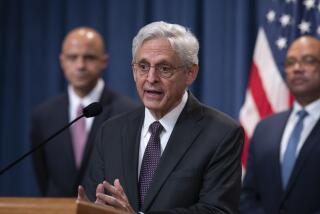Britain court sentences four hackers guilty of cyberattacks
- Share via
LONDON – Four hackers who pleaded guilty to a series of high-profile cyberattacks on computers in the U.S. and Britain, including those of the CIA and Sony Pictures, were sentenced Thursday to up to 32 months in prison.
The four men, all Britons, were members of the hacking group LulzSec, which flaunted its ability to break into the high-security computer networks of such targets as the United States Senate.
In 2011, the group claimed responsibility for hacking into the systems of PBS, media baron Rupert Murdoch’s News International and the U.S. Air Force, among other targets. The attacks caused websites to crash and also resulted in the online publication of people’s credit card numbers and private email addresses.
Authorities say that the incidents inflicted serious harm on the companies’ and agencies’ reputations and financial damage of more than $30 million.
“The actions of these LulzSec hackers were cowardly and vindictive,” said Andrew Hadik of the Crown Prosecution Service in London. “They boasted of how clever they were with a complete disregard for the impact their actions had on real people’s lives.”
The four Brits were arrested between June and September 2011. One of them, Ryan Cleary, was carrying out an attack on the network of Britain’s Serious Organized Crime Agency when police arrested him, Scotland Yard said.
Ryan Ackroyd, 26, Mustafa Al-Bassam, 18, Jake Davis, 20, and Cleary, 21, all eventually pleaded guilty to hacking charges.
Their prison sentences were handed down Thursday in a London court. The longest, 32 months, went to Cleary, who supplied the software to mount the attacks. Ackroyd, who scouted targets, received 30 months, and Davis, the group’s spokesman, 24 months. Al-Bassam, who was a minor at the time of his arrest, was given a 20-month suspended sentence.
The leader of LulzSec, Hector Monsegur, was arrested in the U.S. and became an informant for the FBI. He awaits sentencing in New York.
LulzSec spun off from the “hacktivist” group Anonymous and, authorities say, was interested more in showing off its cyber-prowess than advancing any political agenda or reaping financial gain.
The group took down the CIA’s website for two hours in June 2011. A month later, LulzSec broke into the website of Britain’s Sun tabloid, redirecting visitors to a fictitious story about owner Murdoch committing suicide.
“Theirs was an unusual campaign in that it was more about promoting their own criminal behavior than any form of personal financial profit. In essence, they were the worst sort of vandal, acting without care of cost or harm to those they affected,” Det. Supt. Charlie McMurdie, head of Scotland Yard’s cyber-crime unit, said in a statement. “They claimed to be doing it for ‘a laugh,’ but real people were affected by their actions.”
ALSO:
Car bombings, shooting in Iraq kill at least 17
Taiwan says Filipino apology in fisherman’s death not enough
Global Voices: Palestinian quest for statehood a moving target
More to Read
Sign up for Essential California
The most important California stories and recommendations in your inbox every morning.
You may occasionally receive promotional content from the Los Angeles Times.














